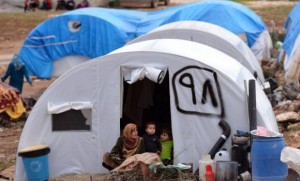By Nourhan Dakroury

(AFP File Photo)
12 human rights organisations, including the Egyptian Initiative for Personal Rights (EIPR) and the Egyptian Centre for Economic and Social Rights (ECESR), called on authorities to adhere to standards of international law when dealing with Syrian refugees in a Tuesday statement.
“The undersigned rights organisations demand that authorities exercise their adherence to the standards of international human rights law and international conventions on refugees,” the statement read.
The organisations demanded “appropriate facilities” for holding detainees prior to deportation, and that the government not “forcibly return Syrian refugees to any place or country where their lives or freedoms might be in danger.”
Hamdy Khalaf, an EIPR lawyer working on the case, said there were 42 Syrians being detained in El-Dekheila police stations, while 62 were being detained in El-Gomrok police station.
Khalaf said the detainees include Syrian refugees and Palestinians with Syrian nationalities, who were arrested by the Coast Guard while trying to travel to Italy.
He added that the refugees, who held visas to enter Egypt, were victims to a fraud in which they paid $4,000 to a man by the name Momen to transport them to Italy by ship.
“They didn’t know that he was setting them up to travel illegally to Italy. When they got to the port, a fishing ship was waiting for them, with the man nowhere to be found,” he said.
The refugees were presented to the prosecution in El-Dekheila and El-Gomrok, which ordered that the Passport Authority and Homeland Security arrange their expulsion, Khalaf said.
“When the organisations talked to the prosecution about the necessity of deporting the refugees, officials there said that it was decided given the current circumstances,” Khalaf said, adding that with news circulating about Syrians joining the Muslim Brotherhood in Egypt and participating in their rallies, the prosecution thought that they form a threat for the internal security of the country.
“Some of the refugees who were initially detained have been already deported, while those detained in El-Dekheila police stations will be deported today,” he said, adding that two families will be expelled to Turkey, while six others, originally Palestinian, will go to Malaysia.
“We had to interfere and appeal to authorities to send the families of Palestinian descent to Malaysia, after authorities had decided that they would depart to Rafah,” Khalaf said.
“The problem now lies with those detained in El-Gomrok,” Khalaf said, explaining that there was not any place in the police station to accommodate all of the refugees.
“Currently, men are being held in the cells, while women and children are being accommodated in the corridors of the police station,” Khalaf said.
“We had asked authorities at El-Gomrok [police station] to temporarily move the women and children to orphanages until their departure, but they said that there was nothing they could do,” he added.
The statement said that there were 34 children being detained, among them one child with Down’s syndrome.
“What we are calling for now is for their living conditions to be better, which is why we sent a letter to the Prime Minister addressing him about the matter,” Khalaf said.
Multiple human rights groups have previously expressed their concern about the situation of Syrian refugees in Egypt.
Human Rights Watch had previously called on authorities to put an end to “arbitrary detention” of Syrians, and the Arabic Network for Human Rights Information called on the government to take serious measures to ease Syrians’ concerns of deportation.
A previous group statement by rights groups, including ECESR, expressed their concern about local media outlets inciting against Syrian and Palestinian refugees residing in Egypt.



